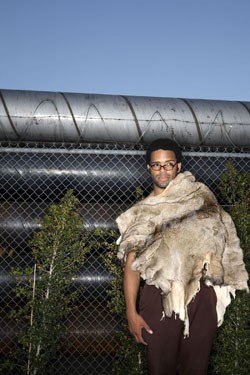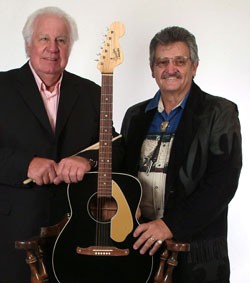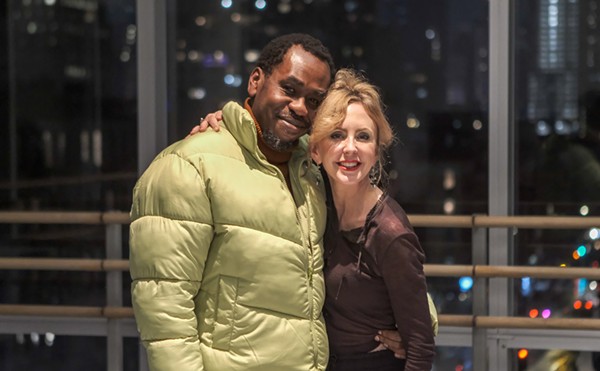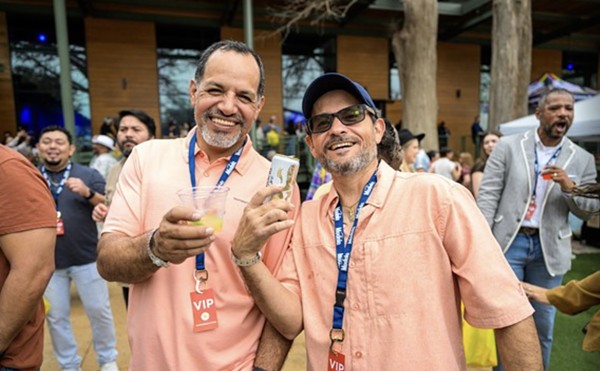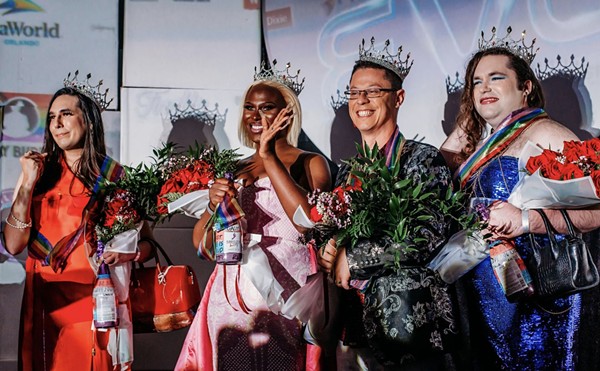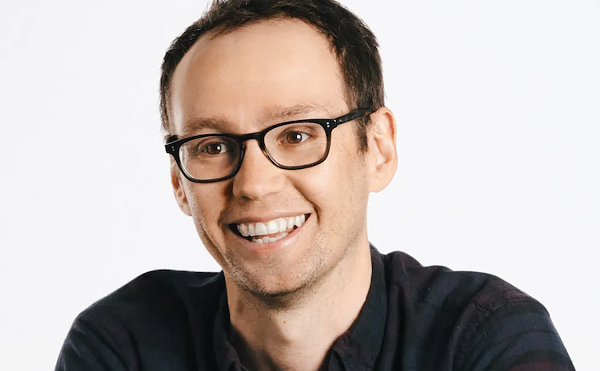In October 2005, in a preview of the inaugural edition of the Anti-Pop Music Festival, I wrote, “Welcome to the beginning of something big,” and opined that this new entity would be giving “Orlando the independent music festival it needs.” Two years later, both of those statements turned out to be true; the latter somewhat more than the former.
Anti-Pop has yet to fully achieve ultimate “something big” status, but since the scattershot first go-round (plagued by scheduling snafus and a hurricane), it has definitely grown bigger, both in its profile and in the rank and number of independent-minded acts. Consider that the festival has brought to town musicians from Hank III and Mute Math to Atmosphere and the National; that’s saying something.
This year, with heavyweights like Aesop Rock, Spoon and David Bazan, the cream of the local crop – Summerbirds in the Cellar, Sol.illaquists of Sound, Cracker Jackson, the Sugar Oaks – and bubbling-under acts like Daedelus, Explosions in the Sky, IAMX, MC Chris and Florida’s own blog-hyped rockers, Black Kids, the Anti-Pop lineup is the strongest to date.
Several vexing wrinkles have been ironed out, as well. This year marks a simplified ticketing situation that won’t require a mathematician to figure out. As usual, Orlando Weekly is here to help guide you through Anti-Pop by profiling some of the more notable acts on the following pages.
Given its centralized presence downtown, Anti-Pop’s 2007 edition may be the one that finally feels like a festival instead of a spread-out affair. Given the high caliber of artists taking downtown stages over in the next few days, this is exactly what the thriving Orlando music scene needs right now. Like I said, “Welcome to something big.”
— Jason Ferguson
Wednesday (7)
Busdriver, Daedelus, Antimc
9:30 p.m. at AKA Lounge; 18+; $10Bus drives a revolutionary route of indie hip-hop
Another election year is peeking right around the corner. What better way to dispel voter apathy than to rock Busdriver’s roots rock–reggae track “The Troglodyte Wins” at the polls?
“The savages have won,” the L.A. rapper explains. “The barbarians have the world. I wrote that song when the Mexican president was being voted in, during that whole fiasco when people protested him being inducted into office. `The song` was a pretty overt reference to the president – whatever leader people voted in – whether it’s the president of Mexico or the United States.”
Or China. Or Iraq. Elections really don’t mean crap when you’ve got secret midnight swearing-in ceremonies and Supreme Courts to decide on the rightful troglodyte. But “The Troglodyte Wins” notwithstanding, Busdriver – Regan Farquhar – is the type of chap who’ll be sporting an “I VOTED” sticker in his next video. That’s because Busdriver is not predictable; he’s not an alternative-lifestyle type with an idealized counterculture slant who never questions things. For instance, despite his occasional references to meat substitutes in tunes, he’s not a vegetarian; he’s a pescetarian like that Bright Eyes guy, sort of.
“Me mentioning something doesn’t really prove or display that I’m dedicated to that thing,” he says. “It’s just a tool, it’s just a device, it’s just imagery. All the words and meanings are textures that add to an overall thing. I may mention warheads or gluten or fucking taxidermy … it’s just a real crackpot obscure kind of style that I sorta know how to do.”
Why haven’t the “I’m so hood” cops arrested him for writing ingenious, ironic disco-rap like the most popular song from his latest LP, RoadkillOvercoat? “Sun Shower” is a pop ditty about people from well-to-do backgrounds (like him) moving to new bohemia to be artists, but when things aren’t working out, they can always retreat to their parents’ homes or wealth.
“People don’t understand urban music at all,” says Farquhar, whose father is a successful television screenwriter. “Rap music in general is not given the credit for what it actually is or was or has been, and there are whole parts of rap history that are routinely ignored. I’m tired of journalists interviewing indie rap acts and saying, ‘Oh and he’s not about the bling,’ as if the bling and the trap-hop and all that shit is the only thing niggas know how to do. It’s really weird.
“There’s a long history of independent hip-hop. There’s a history of like Native Tongues and shit. There’s a whole ’nother side of it that you can subscribe to. Why is that such a stretch?”
— Makkada B. Selah
David Bazan, All Smiles (aka Jim Fairchild), Gasoline Heart, Matt Butcher
7 p.m. at the Social; all ages; $15
Jim Fairchild’s beyond the post-Grandaddy slump
For a guy who sings, “You must have heard the news, I shiver with the blues,” on his debut solo album, Jim Fairchild is surprisingly, maddeningly content.
As one-fifth of indie pop giants Grandaddy, in which he served as guitarist for over a decade, he sees their breakup early last year as being “helpful” to proving their friendships with each other. Fairchild admits he was “at odds” with Grandaddy frontman Jason Lytle for a time, and “the relationships did acquire some friction between some of us for a variety of different reasons.” But he also reflects that “when you have enough space to step back and look at it, it’s like, ‘Yeah, some stuff that happened sucks,’ but you don’t spend that much time with people and not love them.”
Not to mention the fact that Fairchild was the first former member out of the gate with a solo album – Ten Readings of a Warning, released in April under the moniker All Smiles – and he says the guys have been “super-supportive” of the outing. Fairchild reports that Lytle himself, upon hearing the record, wrote his ex-bandmate “a really super-warm endorsement.”
When asked about a recent move from his beloved Portland, Ore., to the infinitely busier and noisier Chicago (to be with his girlfriend, who is attending college there), Fairchild says the transition is fine. “I have to be mindful of how fortunate I am … that I can still do what I want to do from there.”
Surely, no artist can be this rational and clear-headed – right? As this one embarks on a carbon-neutral tour after his new release, expect secrets to pour out in the music. Written completely in Portland, Warning brims with a wistful, stripped-down sunniness, but Fairchild has since written another album’s worth of material while in Chicago. “I love it here, but I do feel there’s a lot of violence in `Chicago`, racial divides and segregation. It’s just a hell of a tense city. The second record is dealing a lot with the people who get left behind.”
Where Fairchild purposely unplugged in every sense on Warning, distancing himself from his former band’s lush, electronic-laced pop dreamscapes with simple guitar-and-piano escapism, he says the Chicago stuff has “very little acoustic guitar, and almost no piano. There’s a lot of distorted guitar, big-sounding drums. It’s gonna be a more intense, rocking record.”
At this moment, however, Fairchild is focused on reliving the moment, post-Grandaddy, when he finally allowed himself to just play. “I’d always written songs during Grandaddy, but I didn’t have enough gumption to make sure my voice was heard. This sounds like a really dramatic thing to say, but I think if I hadn’t finished this record, I’d be in a fucking sore spot.” He did finish it, though, so in spite of everything, Fairchild is back to that word again: “I’m content.”
— Justin Strout
Other Wednesday shows:
- Daphne Loves Derby, This Providence, the Higher, Reign of Kindo; 5 p.m. at AKA Lounge; all ages; $12
- Dish, Jonathan Appleseed, Giddy-up Helicopter, Christian Summer; 9 p.m. at Central Station Bar; 21+; $5
- Kickoff Party with Party Smashers; 10 p.m. at Matador; 21+; free
Thursday (8)
- Unknown Hinson, Big Jef Special; 8 p.m. at the Social; 18+; $10
- The Bravery, Straylight Run; 7 p.m. at Club Firestone; all ages; $12
- The Ropes; 9 p.m. at AKA Lounge; 18+; $10
- Spacebar, Win Win Winter, the Collective; 9 p.m. at Central Station Bar; 21+; $5
Friday (9)
Spoon, the Stills, the Julius Airwave
7 p.m. at Club Firestone; 18+; $20
Spoon’s good medicine follows major suffering
For the music business, the times they are a-changin’. It’s happening on such a fundamental level, at such a dizzying rate, that the headlines are declaring the end of days for the industry. But that applies mainly to the hulking major labels; the digital era has been a bane to their slow-to-evolve machine. While dealing staggering blows to the Goliaths, however, technology has been a vehicle of immense empowerment to independent labels as well as to musicians themselves. So what the industry is experiencing is a tectonic shift, not wholesale demolition. Just ask Spoon.
This century may be cruel to the fat cats, but the career trajectory of the Austin-based indie rock band has been notably upward. Being on the growing list of success stories coming from the upstart independent ranks makes Spoon an apropos headliner for the alt-minded Anti-Pop Music Festival.
Spoon’s path hasn’t all been Easy Street, though. After generating a quick buzz from only a couple of independent releases, they landed a deal in 1998 with Elektra Records. The promised land, right? Wrong. They were unceremoniously dropped after one album, the presciently titled A Series of Sneaks. Left professionally homeless for about a year and a half, Spoon was impelled to rip a caustic two-song EP, The Agony of Laffitte, openly aimed at Ron Laffitte, the Elektra A&R rep who signed them.
“In majors, they just don’t nurture bands,” says Spoon drummer and co-founder Jim Eno. “There’s no way we could’ve put out four or five records on a major and still been around today, I don’t think.”
Despite demonstrating a fetching sense of melody from the start, the band has always exercised creative license with the way they’ve expressed it. Over the years, their sound has traversed broad territory, spanning wiry post-punk, spacious lo-fi and, lately, buoyant piano-laden pop. It’s a course that bucks predictability and has earned them critical praise and a healthy cult following. Of this approach, Eno offers, “We want our records to sound as varied as possible.” But their skillfully honed formula – a minimalist construct of meticulous proportioning, instinct for tune and a left-of-center sensibility – is a far easier sell for the finer palate of the underground.
Illustrious Chapel Hill, N.C., indie label Merge Records eventually scooped them up, and since then things have been good for Spoon. The rather contemporary twist on the tale is that since their return to the smaller-scaled independent side of the music business, they’ve seen rapid rises in their profile and record sales.
“The last four records have basically doubled sales from the previous record,” Eno notes. “Everyone’s talking about the death of the music business, but we’re lucky enough to be doing well during this time.”
Since emerging with their debut album in 1996, they’ve seen the entire landscape of the music industry change around them, and Eno believes it’s for the better. “I think the thing that’s very exciting about music nowadays is the fact that you can be on an independent label and make ends meet a lot easier than you used to be able to, especially with the people who get music into commercials and films now embracing independent bands way more than they ever have,” he says.
The relocation of Eno’s writing partner, singer/guitarist Britt Daniel, to Portland, Ore., earlier this year was a development that pushed Spoon even further into the modern band model – geography isn’t essential for a group to stay together (see the Postal Service). Having just built a large studio in his backyard, Eno has no plans to leave Texas anytime soon. “We keep in touch every day,” he says. “Also, with the Internet, we’re sending stuff back and forth all the time.”
Piss may be dripping down the leg of desperate music suits, but Spoon members are whistling while they work. “We’re having fun doing what we’re doing,” Eno assures.
— Bao Le-Huu
Aesop Rock, Black Moth Super Rainbow, Blockhead
9 p.m. at the Social Pavilion; 18+; $15
The word according to Aesop Rock
(Deep breath …) Coachella, Bonnaroo, Paid Dues Festival, Rock am Ring, Musicfest Northwest, Capitol Hill Block Party, Pitchfork Music Festival, Rock the Bells, SXSW, Fuji Rock, CMJ Music Marathon, Roskilde Festival. These are a sampling of the festivals 31-year-old hip-hop veteran Aesop Rock has played – played! – in the past few years, never mind the ones where he just moseyed around. This week he graces our own pride and joy with his grizzled brand of metaphor mazes and aphorism assaults in celebration of his latest opus, None Shall Pass. But before you go jumping into this thing we call Anti-Pop, take heed: Uncle Ace has some guidelines to learn ya.
Keep it loose
“The main thing about festivals that you have to understand is that it’s difficult to pull off some of the venue stuff. Festival organizers keep a sharp eye on the clock; there is often no sound check, etc. I always try to cater my set to the festival audience by making it as power-packed as possible. Fewer quiet numbers, more jams that move. They all have similar things going on, but at the same time you never really know what you’re gonna get when you arrive at your stage.”
Approach the artists! Beware the scowl
“I do my best to always show a massive appreciation to any fan anywhere. Unless I’m having a really, really shitty day, I will most likely do my best to thank anyone that approaches me.”
Anything goes … anything
“If you like an artist and want to wear their shirt to their own show, then go for it. Hell, I would never tell anyone to not wear an Aesop shirt. If you’re only pounding a fist in the air, you’re not having a good enough time. Dance badly. Dance away, the worse the better. Also, if the mood strikes you to make out during a set, remember you may not find yourself in that position again; those bands, that environment, weather conditions, etc., so make out. Whatever you’re into: fellatio, cunnilingus, intercourse. Do your thing.”
It’s Anti-Pop, not anti-capitalism
“Pitchfork festival was hot as hell, and while nobody should ever have to pay $7 for water, if it’s that $7, or dehydration leading to passing out, you may wanna bite the bullet. Some of these places don’t let you bring in your own food and drink, which is insane, so that $7 water may be your only option. There are all sorts of ways to spend/waste money at these events. I say do what you want. You want a Discover card at that very moment? Sign up, bitches.”
Scrapping gets you scrapped
“I’ll usually let a fight go for 30 seconds or so with the hopes that it will dissipate. If nobody is doing anything, and people are really going at it for an extended and increasingly intense period of time, I have been known to stop the show. This usually results in me cursing and saying rude things into the mix at the participants, which I occasionally later regret. It really is infuriating though. Very distracting.”
You want a playlist, try iTunes
“People have yelled for ‘Daylight’ `Aesop’s well-known tune` a lot. I usually play it anyway, if not in the set, then as an encore. But when I’m two songs deep in a 60-minute set, there’s definitely a ‘hold-your-horses’ moment. I mean, I get it; it’s a crowd favorite and I am thankful to even be in a position where the crowd has a favorite, but I would also hope that at this point they would trust that I’m not gonna let them down.”
Do what makes you happy (which is not festival-specific)
“Even though I’ve always put a ton of time and energy into my work, I did get married, moved across the country and quit smoking cigarettes. Those are pretty big, but I’m still a total basket case at all times. I’m like rap’s Woody Allen – always flustered in one way or another. That said, aside from all of the stress I bring on myself, I do have a lot of happy things going on. My wife is wonderful, and she really keeps me calm and grounded more than anyone ever. That helps.
“I also just put a ton of hours into music, and I approach it as art way before business. Granted, it is my job, but it’s my passion first. I make what I want, and when it’s all done, we figure out how to sell it. I just try to keep myself amused by experimenting. Sometimes it works, sometimes it doesn’t. But it’s all me.”
— Justin Strout
The un-goofy grooviness of Black Moth Super Rainbow
Pennsylvania’s Black Moth Super Rainbow swears their artistic pursuit is a populist one. “I don’t want to just make weird music for the sake of making weird music that nobody can latch onto,” says singer/centerpiece Tobacco. “I’m really interested in making stuff that anybody can get into.” But with music that plays like the otherworldly soundtrack to an early-’70s art film, mainstream embrace is unlikely. No matter, though, because Black Moth Super Rainbow is creating exceptional, intriguing pop music that straddles light and darkness. Recalling mood-thick visionaries like Air, their psych-pop is a kaleidoscope that shimmers with the lo-fi splendor of vocoders and analog electronics.
The seed of their sound, a fascination with sonic strangeness, was planted at childhood. “I used to love the little bumpers in between shows on PBS,” he reminisces. “I grew up in the early ’80s and there were a lot of weird sounds then.” It wouldn’t germinate, however, until after high school, when he discovered Boards of Canada’s Music Has the Right to Children. “They used a lot of old synths and that’s when I realized people were using that stuff again and that’s what made me decide to look into what those things were,” Tobacco recalls. Though their sounds are electronically derived, the music itself hums with an organic pulse because the instruments are played, not programmed. He admits, “I don’t even know how to MIDI-sequence anything.”
Their penchant for developing ideas in secluded rural settings figures heavily into the atmosphere of the music. Their latest album, Dandelion Gum, was recorded in a cabin in the backwoods of western Pennsylvania, which helped to evoke the dark side of their sweet/sinister formula. “It was more the creepiness of being out there and the weird stories that we would tell each other and trying to turn those into sounds,” he notes.
The band members each have an evocative pseudonym by which they are known: Tobacco, The Seven Fields of Aphelion, Power Pill Fist, Iffernaut and Father Hummingbird. The frontman’s handle was inspired by a character in the 1987 B movie Redneck Zombies. “He was called the Tobacco Man and he chewed tobacco when he was a kid or whatever and it rotted his whole face and he had to wear this weird mask,” he says. “He would always creep me out really bad.”
Despite insisting on being addressed by trippy aliases and exaggerated psychedelic tendencies, the band has no tongue in its cheek. “People say the music might be kind of goofy or whatever, but it’s not meant to be,” Tobacco says. “I don’t really do anything that I would consider goofy or silly in our music.”
— Bao Le-Huu
Blockhead out from behind the mixing board
It’s inconceivable that Tony Simon is on tour for the first time with MCs. He’s been making beats for years – the record sleeves housing his work read “production by Blockhead” when he backs rappers like Aesop Rock or Cage – but if the low-profile New Yorker actually ventures out, he’s accompanied by other producers, and it’s in support of his instrumental releases. Although his production on Ace Rock’s None Shall Pass is turning heads once again, Blockhead’s solo Ninja Tune LPs are of the wordless kind.
“It’s a different vibe,” says Blockhead of his current trip with Aesop, DJ Signify and the vocoder-toting Black Moth Super Rainbow. “Usually when you tour with instrumentalists, it’s a lot more tame, and the crowds … you don’t really know what to expect. But these guys are all hyped and amped to be there. It’s a nice change of pace.”
Because of their melancholy nature, Blockhead’s two well-known instrumental full-lengths, 2004’s Music by Cavelight and 2005’s Downtown Science, encouraged the music press to brand the producer an adrift, moody musician. Cavelight’s largely organ loop-driven murkiness saunters at a funeral-march pace in places, while the subsequent Downtown Science LP – still a bit gloomy – is comparatively brighter, laden with an overt “I Love New York City” theme that materializes in sped-up snippets borrowed from a stage play record.
A load of unusual samples on Blockhead’s Uncle Tony’s Coloring Book shook up the offices at Ninja Tune, so the label heads decided to do a limited pressing of 5,000. Though the distribution effort seems even more modest than usual, the producer’s newest work was intended for a self-released side project and boasts a considerable shift in sound. Uncle Tony’s is outlandish and humorous, often indicative of its maker’s jovial demeanor. In his bedroom studio (“probably the least futuristic studio in the history of hip-hop,” he says. “It’s literally a sampler and a record player”), Blockhead lined up disco beats and brass loops, backward-swirling pitched-up vocal chirps and, of course, campy vintage dialogue for its mostly uptempo instrumentals.
“It’s a natural thing for artists to do,” he says of the album’s unlikely arrangements. “Everything you do is like an answer to what came before it, unless you’re one of those people who wants to make the same album over and over again. After Cavelight, I felt pigeonholed by this ‘depressed dude’ image, so I made Downtown Science as an answer, like ‘How about this?’
“In each one, I’m trying to expand the spectrum in which I can work. I don’t want to be cornered in by one style. I’d rather just show what I can do, and maybe after this album, the next one will be a mixture of everything.”
— Dominic Umile
The Legendary Tennessee Three, Hindu Cowboys, Thomas Wynn & the Believers, the Sugar Oaks
9 p.m. at the Lodge Outdoors; 18+; $12
Spiritual revelations from Johnny Cash’s backing band
There is perhaps no greater exemplar of America than Johnny Cash. His music is truth, unfiltered and undiluted, completely of the human soul. It resonates with punks and intellectuals as deeply as with cowboys. Its footprint on the cultural psyche is so wide and deep that it simply transcends genre. As his fifth and final American Recordings work with producer Rick Rubin and the hit 2005 biopic Walk the Line reinforce, the music of the Man in Black has never been more relevant.
Indeed, Cash was the voice, but he relied on one band for his sound. From his Sun Records days in the mid-’50s until his partial retirement in 1997 due to poor health, that band was the Tennessee Three. They are the men who provided that minimalist, essential vehicle. Cash being a key figure in the very birth of rock & roll, his band’s work with him helped forge the template of contemporary music. Though they sit in his colossal shadow, due credit is owed for their role in the creation of that timeless sound.
Upright bassist Marshall Grant left in 1980 (currently replaced by Lisa Horngren) but two of the original three still drive the band. First dubbed Johnny Cash & the Tennessee Two at the beginning of his recording career, Cash’s troupe became the familiar Tennessee Three in 1960 when drummer W.S. Holland came aboard. Widely cited as the first rock & roll drummer, Holland’s career began at Sun Records in 1954 as the drummer for rockabilly forefather Carl Perkins. In 2004, he was awarded the International Rockabilly Hall-of-Fame Lifetime Achievement Award for “The Heartbeat of Mega Hits for 50 Years.”
Guitarist Bob Wootton succeeded original guitarist Luther Perkins after his death in 1968, playing on most of Cash’s biggest hits. Throughout the years, Wootton often provided vocal accompaniment since his voice bears a haunting resemblance to Cash’s. Because of that, he now assumes lead vocal duties. His clan fills out much of the rest of their current lineup, with wife Vicky on vocals and rhythm guitar and daughter Scarlett on vocals.
In 2006, the Tennessee Three recorded a tribute to their late captain, fittingly titled The Sound Must Go On, and they now travel in the restored JC Unit One, Cash’s original tour bus.
With its expressly independent spirit, the Anti-Pop Music Festival is clearly bent toward the vanguard, which often means youth. But there are few purer manifestations of that spirit than Johnny Cash, and the Tennessee Three is a momentous addition that contextualizes the rest of the event’s proceedings. As the only ones who can truly claim to be living legends playing some of the greatest American music ever made, this is the act that can make the hot-shit headliners kneel in deference.
— Bao Le-Huu
Other Friday shows:
- Happy Hour with Attachedhands; 7 p.m.-10 p.m. at SKY60; 21+; free
- IAMX, Hourly Radio, People Noise; 9 p.m. at the Social; 18+; $12
- MC Chris, Cracker Jackson, Mayday; 9 p.m. at AKA Lounge; 18+; $12
- American Bang, the Lighter Exchange, Leslie; 9 p.m. at Wall St. Plaza Stage; 21+; $6
- SNMNMNM, Mirror Pal, Karasoul, CPM; 9 p.m. at Central Station Bar; 18+; $5
- Last call midnight-2 a.m. at Lizzy McCormack’s with $1 PBRs
Saturday (10)
Craig Wedren, Jonah Matranga, Travis Adams
9 p.m. at AKA Lounge; 18+; $10
Craig Wedren can’t shake the habit
Originally from Shaker Heights, Ohio, Craig Wedren moved to Washington, D.C., in 11th grade and shortly thereafter started the band Shudder to Think. Wedren brought a different aesthetic and singing style to the post-punk D.C. sound of his mates, creating one of Dischord’s most distinctive acts, while unintentionally ushering in (with Rites of Spring) emo.
“I don’t hear it. I guess histrionic high-pitched vocals – I did a lot of that,” Wedren laughs, also acknowledging that chunky post-punk guitar is an emo staple. “And big dynamics, loud then whisper – whatever, man, I’ll take `the blame`.”
Wedren has room to be magnanimous; he’s built a career scoring films since Shudder to Think shuttered its doors in 1998. He’s worked on the über-successful School of Rock (2003), including contributing the song “Heal Me, I’m Heartsick,” The Baxter (2005) and Balls of Fury (2007) as well as David Wain’s cult favorites The Ten (2007) and Wet Hot American Summer (2001) before that. But while the movie work bought him comfort, it didn’t bring peace of mind.
“Like having a phantom limb, I’ve continued to write songs since Shudder to Think,” Wedren says. “So I have a mountain of raw material which was starting to really kind of scratch at the back of my neck or appear in the periphery of my vision and tap at the top of my head.”
Though he released the reflective singer/songwriter pop CD Lapland in 2005, Wedren wasn’t satisfied. So he began writing harder, rock-oriented tracks for an album called WAND. But after writing an album’s worth of material, that wasn’t enough either, so he wrote a movie around it.
“I thought, ‘OK, I’ll just make another record,’ and I would be like, ‘I don’t know, that’s not that exciting. It’s not that interesting. Well, what can I do?’ And it was right there in front of me, because it’s just combining everything I’m already doing,” he says. The sound spans everything from “big, heavy, angular and idiosyncratic stuff to the stuff I’ve been working on in film – more orchestral, cinematic and soundscape-y.”
Wedren has finished a rough sequence for the music and written a script for the film. He’s about to finish up the music and start shooting the movie, which will resemble Godfrey Reggio’s Koyaanisqatsi, or as Wedren describes it, “an album you have to go to the movies to hear.”
Besides this ambitious project, he also expresses interest in a Shudder to Think reunion – spurred by a performance in September with A Camp, which features former STT guitarist Nathan Larson, his wife (ex-Cardigan) Nina Persson and one-time STT drummer Kevin March. After performing some of the old songs, Wedren got to wondering: “What if we did a tour – worked on some songs and even if we just did singles or something like that – would they come?”
There’s only one way to find out, and the ever-adventurous Wedren sounds willing to explore it. Shudder to Think fans: Keep your fingers crossed that he doesn’t get sidetracked.
— Chris Parker
Other Saturday shows:
- Afro-Punk Night with Sol.illaquists of Sound, Black Kids, G.A.M.E. Rebellion, screening of Afro-Punk; 9 p.m. at the Social; 18+; $10
- Gerry Williams, No Circus, the Redwalls, In Passing; 9 p.m. at the Lodge Outdoors; 18+; $5
- Explosions in the Sky, Summerbirds in the Cellar; Dead Confederate; 8 p.m. at Club Firestone; all ages; $15
- Pete Woj & the Accused; 9 p.m. at Wall St. Plaza Stage; 21+; $6

